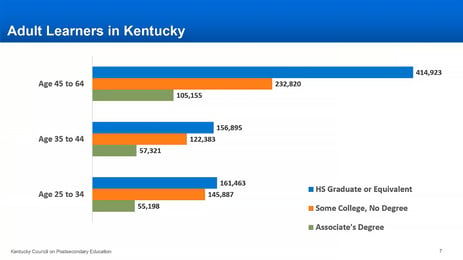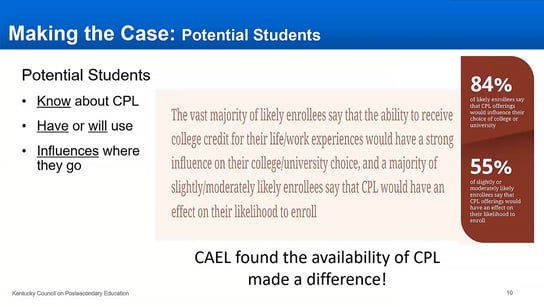Share this
CAEL CPL Research Takes Center Stage in Kentucky Strategy to Engage Adult Learners
by Carlo Bertolini on Nov 27, 2023
CAEL is figuring prominently in a Kentucky Council on Postsecondary Education (CPE) effort to boost the use of credit for prior learning (CPL) throughout Kentucky. The three-part webinar series, which debuted last month, is inclusive of practitioners who may have little familiarity with CPL even as it presents CAEL research showing that the concept of CPL resonates with a strong majority of adult learners -- if not in name, then in practice.
Amanda Johannsen, associate director of postsecondary completion and adult learning at CPE, and Dr. Dallas Kratzer, a CAEL Ambassador and CPE senior fellow for academic excellence and student success, are hosting the webinars. During the series kickoff, Johannsen and Kratzer combined state demographic data with multiple CAEL findings to make an urgent case for CPL as a catalyst of enrollment, completion, and workforce success.
That urgency is a reflection of CPE's strategic agenda for higher education in the state, which runs from 2022 to 2030. Among its priorities is limiting barriers to enrollment and completion for adult learners, whether they are resuming a postsecondary education or embarking upon one. While these efforts come during a time of challenging enrollment trends, there are also reasons to be optimistic about adult learners. The webinar repeatedly presented CPL as a solution for capturing those opportunities.
More than 410,000 adult learners between the ages of 45 and 64 in Kentucky have never enrolled in college. Nearly 233,000 more completed some college and no degree. Because such students have accrued a wealth of learning experiences, CPL is a natural bridge for overcoming enrollment and completion barriers, the presenters suggested.
Despite the large population of adult learners, their enrollment has decreased in recent years, a trend CPE hopes to counter. Johannsen noted that traditionally underserved students are disproportionately represented in Kentucky's population of adult learners. The council, she said, wants to ensure "that our doors are truly open to adults in Kentucky so that they can engage with institutions of postsecondary education to gain social mobility and ... the ability to earn a living wage for themselves and their families."
CAEL's research, Johannsen and Kratzer noted, indicates that CPL is an effective way of not only keeping those doors open, but motivating students to walk through them. They cited findings from Attracting Adult Learners With Credit for Prior Learning that show CPL is a strong influence on enrollment decisions. "Schools who understand and apply CPL effectively will attract students," said Kratzer. 
Such students can bring resiliency to college enrollment in the face of looming demographic-driven declines in high school cohorts, said Kratzer. A trend within that trend is further complicating the challenge, he added, referring to the growing number of high school graduates who are eschewing college for microcredentials and other short-term credentials that offer immediate workforce relevance.
These tendencies are all the more reason to embrace CPL, suggested Kratzer. Within the workforce, there will always be an adult learner population that colleges and universities can engage, and they need to be more effective doing so, he argued, especially when postsecondary credentials remain key to helping workers advance deeper in their careers.
On that count, CPLs natural ability to bridge education and employment can help institutions keep programs closely aligned with the latest workforce needs, said Kratzer. "When we recognize the value of learning that goes on in the workplace, this adds credibility to what we're saying as academics, as faculty members: that the teaching that we have in our institutions is being used in the workforce."
At the same time, CPL spares learners the demotivating task of sitting through classes dedicated to something they've already mastered. Kratzer stressed that CPL doesn't reward learners with shortcuts so they can skip ahead. It's more of an express lane that doesn't penalize them with U-turns that put them behind. "We do not give credit," he insisted. "This [CPL] is credit that's already been earned, because they did the work. And if they can prove that they did the work, we should award or recognize their learning."
Doing so, said Kratzer, is fundamental to why CPL is so attractive to adult learners. As someone with years of experience helping students complete portfolios, he described the eureka moment when learners realize the level of learning they have amassed. "They say, 'Wow, I never thought of myself as a college student.' And it just opens the door and then they do great things. It's an amazing result once they jump in."
As further evidence, he and Johannsen cited CAEL's earlier research that ties CPL to substantial increases in completion, reductions in degree cost and time to complete, and even improvements to the number of total (paid) credits completed at institutions. However, the study also showed that CPL is underutilized, especially among underserved students.
The good news is that the more recent CAEL data show that a majority of surveyed learners were familiar with CPL in practice. Nearly all had either participated in CPL or planned to. But while there may be general familiarity with CPL as a concept, Johannsen and Kratzer cautioned that CPL, PLA, and other technical terms don't resonate on their own. In addition, learners with higher income were more likely to be familiar with and pursue CPL.
Johannsen urged institutions to be more integrative in their approach to CPL. She pointed out that students often don't learn about CPL until they're well into their programs and find themselves a few credits short of completing their degree. She suggested incorporating CPL within the student lifecycle so that it's discussed at the first points of engagement, including career advising.
The second installment of the webinar, focusing on the myriad manifestations of CPL and how they function at Kentucky institutions, was held Nov. 14. The final in the series will occur Dec. 8 at 10 a.m. ET and will share best CPL practices within Kentucky and around the country. Registrations for the webinar, including recordings of past events, can be completed via Zoom.
Share this
- Adult Learner Success (130)
- CAEL Members (106)
- Success Stories (97)
- Workforce Development (76)
- Credit for Prior Learning (75)
- Impact (70)
- Best Practices (68)
- Career Pathways Support (44)
- Strategic Partnerships (41)
- Work-based Learning (34)
- Trends in Higher Education (33)
- Curation (30)
- Upskilling and Reskilling (29)
- Q&A (23)
- Inclusion (22)
- Policy (22)
- Military-connected Learners (19)
- Short-term Credentials (19)
- Talent Management (19)
- Research (18)
- Retention and Completion (18)
- Adult Learner 360 (17)
- Enrollment (15)
- Student support (12)
- Transfer Students (12)
- Adult Learner Academy (10)
- Competency Based Education (CBE) (10)
- Education Benefits (10)
- In the news (9)
- Student Stories (9)
- Experiential Learning (8)
- Guest blog (8)
- HBCUs (8)
- EPCE (7)
- NACTEL (7)
- Online Learning (7)
- Apprenticeships (6)
- Case Studies (6)
- Featured (6)
- HSIs (6)
- Wraparound Support (6)
- Community colleges (5)
- Credit Predictor Pro (4)
- Future of work (4)
- COVID-19 (3)
- Comebackers (3)
- Structural Approaches to Learning (3)
- Tuition (3)
- Accelerated Program (2)
- Professional development (2)
- Student parents (2)
- Chambers of commerce (1)
- Skills-based hiring (1)
- Upcoming (1)
- February 2026 (1)
- January 2026 (3)
- December 2025 (5)
- November 2025 (6)
- October 2025 (6)
- September 2025 (13)
- August 2025 (5)
- July 2025 (5)
- June 2025 (11)
- May 2025 (8)
- April 2025 (8)
- March 2025 (8)
- February 2025 (8)
- January 2025 (5)
- December 2024 (5)
- November 2024 (4)
- October 2024 (8)
- September 2024 (7)
- August 2024 (10)
- July 2024 (9)
- June 2024 (8)
- May 2024 (11)
- April 2024 (5)
- March 2024 (7)
- February 2024 (5)
- January 2024 (7)
- December 2023 (10)
- November 2023 (7)
- October 2023 (3)
- September 2023 (4)
- August 2023 (3)
- July 2023 (5)
- June 2023 (8)
- May 2023 (9)
- April 2023 (5)
- March 2023 (6)
- February 2023 (5)
- January 2023 (3)
- December 2022 (4)
- November 2022 (7)
- October 2022 (7)
- September 2022 (6)
- August 2022 (6)
- July 2022 (4)
- June 2022 (6)
- May 2022 (4)
- April 2022 (4)
- March 2022 (3)
- February 2022 (5)
- January 2022 (5)
- December 2021 (4)
- November 2021 (2)
- October 2021 (8)
- September 2021 (4)
- August 2021 (4)
- July 2021 (2)
- June 2021 (6)
- May 2021 (5)
- April 2021 (9)
- March 2021 (8)
- February 2021 (5)
- January 2021 (4)
- December 2020 (4)
- November 2020 (3)
- October 2020 (6)
- September 2020 (2)
- August 2020 (1)
- July 2020 (4)
- May 2020 (2)
- April 2020 (1)
- March 2020 (2)
- February 2020 (2)
- January 2020 (3)
- December 2019 (2)
- July 2019 (1)
- May 2019 (1)
- February 2019 (1)
- January 2019 (1)
- October 2018 (4)
- September 2018 (1)
- August 2018 (1)
- July 2018 (1)
- May 2018 (1)
- April 2018 (2)
- March 2018 (1)
- February 2018 (2)
- September 2017 (1)
- August 2017 (2)
- July 2017 (5)
- June 2017 (4)
- May 2017 (3)
- March 2017 (1)
- February 2017 (4)
- December 2016 (3)
- November 2016 (1)
- October 2016 (3)
- August 2016 (8)
- July 2016 (2)
- June 2016 (2)
- May 2016 (5)
- April 2016 (2)
- March 2016 (6)
- February 2016 (9)
- January 2016 (4)
- January 2015 (2)
